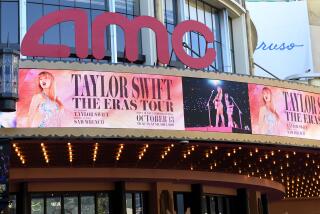Netflix’s ‘Beasts of No Nation’ hints at hazy hybrid future
Ever since Netflix acquired Cary Fukunaga’s new movie “Beasts of No Nation” a few months back, questions have hovered above its release.
The child-soldier drama had plenty of awards-season buzz given both its topic and directorial pedigree. It also stars Idris Elba. But Netflix was new to the feature game, and decidedly hard-line on theatrical windows, and so the question became: How much of a theatrical push would the movie receive, and in what way?
The issue grew more fraught this spring when many theater chains said they would boycott the movie’s release. Their move cut right to the crux of the windows issue (basically, how much Hollywood should retain a system in which filmgoers are required to see a movie in theaters early in its run instead of being given the chance to see it via various on-demand technologies at the same time).
SIGN UP for the free Indie Focus movies newsletter >>
This week, some of those variables began to come into focus. On Tuesday the Toronto International Film Festival said it would screen the movie as part of its regular mix of big theatrical award-season hopefuls, and on Wednesday, Venice followed suit. (You can watch a newly released teaser in the window above.)
On Thursday morning, Netflix laid out its plan, revealing that it has struck a deal with the Landmark theater chain and new specialty distributor Bleecker Street to release the movie in theaters (about 20, in the nation’s biggest cities/art-house markets) simultaneous with its debut on Netflix. A number of smaller independent theaters are sure to follow; the major chains (many of which, in fairness, would probably not go all-out for a difficult drama like this in the first place) are likely to hold their ground.
The deals are something of a coup for the movie, which instead of having to ride it out in streaming solitude is now part of the specialty mainstream -- and can partake in the traditional review spaces and physical-world exposure that comes with it. It’s a hybrid model that seeks to capitalize on what each platform has to offer (and, not insignificantly, convince Fukunaga and other top-tier filmmakers they wouldn’t have to give up a coveted theatrical release by going with Netflix).
At the same time, the move points up how uncertain the prospects are for a Netflix-theatrical marriage down the road.
Consider the scenarios. If Netflix viewership is truly high, a few art-house theaters don’t add much to the bottom line, and it will likely just be a matter of time before they fall away as a key part of the release strategy. Netflix can make the case to filmmakers that those theaters are not really needed to gain viewership for their film. The company will also be able to make the case to media that Netflix movies should be reviewed as big-screen features even if they’re only available on the small screen, and mount the argument to Oscar voters that the theater-only rule is out of date.
If viewership is not that high (and part of the problem is that only Netflix knows), filmmakers won’t be happy with the release in just a few dozen theaters. Sure, it’s fine (maybe) for a challenging drama like “Beasts,” but not for many movies, and not in the long term. And so the filmmakers will push back against Netflix and its simultaneous release strategy. Either way, this in-theaters-but-only-kinda approach won’t be tenable. Netflix will either decide it doesn’t need them at all, or filmmakers will say they need them a lot more.
What shape theatrical movie-viewing will take in the coming years remains one of the industry’s big questions. It’s possible the business is heading for a kind of bifurcation, in which traditional windows remain in place for spectacle-driven studio movies that need (and get a big chunk of money from) the biggest chains, while a parallel streaming-theatrical system a la Beasts develops for the non-tentpoles.
But in the long term it seems inevitable that matters will come to a head. If Netflix is serious about upending the windows system -- while theater chains, perceiving an existential threat from streaming, are determined to block them -- something will have to give. A staring contest can only go on so long without someone starting to lose it.
Ted Sarandos, the architect of this Netflix strategy, says consumers simply want choice on movies: some want theaters and some want laptops. There’s enough revenue to go around, he says.
Yet it’s hard to conceive of a world where one platform doesn’t start to gain an edge--where both sides, effectively, can sustain themselves splitting the pie. There may be some coexistence -- on some movies even for a substantial period. But long-term for many films, theatrical is either a factor or it isn’t, and Netflix either needs it or it doesn’t. “Beasts” is a movie looking to balance both. How many more can do so remains to be seen.
Twitter: @ZeitchikLAT
MORE
‘Orange Is the New Black’ cast members on their lake dive, hopes for new season
Chelsea Handler on her new Netflix life: ‘I’m very happy where I am now’
Netflix, on a roll, seeks to double its L.A.-area office space
More to Read
Only good movies
Get the Indie Focus newsletter, Mark Olsen's weekly guide to the world of cinema.
You may occasionally receive promotional content from the Los Angeles Times.







